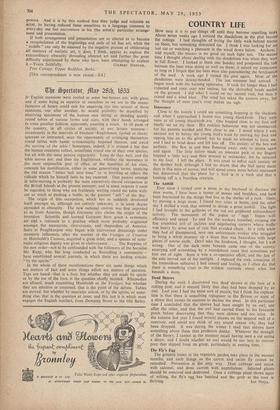tirbe 6pettator, lflap 28b, 1853
It7 English mansions were roofed as some bee-houses are, with glass, and if some being as superior to ourselves as we are to the manu- facturers of honey could cast his enquiring eye into several of those mansions, one after another, he would probably be mystified by Observing specimens of the human race sitting or standing quietly round tables of various forms and sizes, with their hands arranged in some peculiar fashion, apparently awaiting a result. In all parts of the country, in all circles of society, at any leisure moment— occasionally in the intervals of business—Englishmen, foolish or clever, ignorant or instructed, seize the opportunity of arranging themselves round tables with hands systematically imposed thereon, and await the moving of the table! Sometitnes, indeed, it is around a hat that the human creatures collect, sometimes round one of their own species; but all with the same passive expectancy. Long do they wait, and the table moves not; and then the Englishman, whether the statesman in the most responsible post of office, or the humblest of his class, conceals his mortification, either in some generalising terms, implying the old maxim "better luck next time," or in levelling at others the ridicule which he himself feels he has incurred. That passive attempt in table-moving is probably the most extensively-shared occupation in the British Islands at the present moment; and in some respects it must be regarded, to those who are fruitlessly waiting round the table with- out so much as pushing a bottle, as the greatest " sell " of the day.
The origin of this occupation, which has so suddenly developed Itself amongst us, although not entirely unknown, is in some degree shrouded in obscurity. The now national custom was first imported to us from America, though Germany also claims the origin of the Invention. Scientific and learned Germans have given a systematic air and a rationale to a practice which more probably originated amongst the mesmerists, clairvoyants, and rhapsodists of America. Seers at Poughkeepsie who began with clairvoyant dreamings under mesmeric influences, after the manner of the Vestiges of Creation or Humboldt's Cosmos, acquired a great eclat, and a species of syste- matic religious dignity was given to clairvoyance.... The Rappites of the new order—not to be confounded with the followers of the Socialist Mr. Rapp, who has long conducted so flourishing a community— have established several journals, in which there are leading articles ," by the spirits." In the whole of these manifestations there are some things which are matters of fact and some things which are matters of question. Taps are heard—that is a fact; but whether they are made by spirits or by the toe of the foot, is the question chiefly mooted. Rhapsodies are effused, much resembling Humboldt or the Vestiges; but whether they are intuitive or crammed, that is the point of the debate. Tables are moved; but whether by muscular action, or by the spirits, or some- thing else, that is the question at issue; and this last it is which most engages the English intellect, from Downing Street to the Old Bailey.


































 Previous page
Previous page